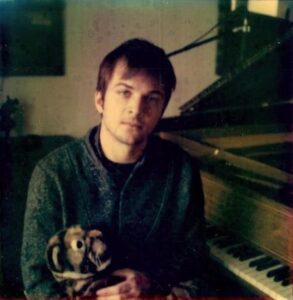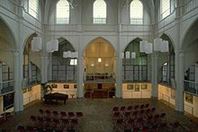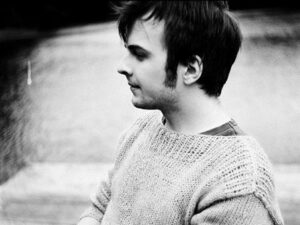One of the great things of entering a venue long before the first note will be played, is that you get a chance to slowly drink in the atmosphere of the place. This night, the Paradiso feels like an enlarged living room, with the floor filled with chairs. Since this is going to be a concert that will benefit immensely by a hushed audience, sitting seems like a good choice. Which brings me to a second great thing of getting to shows like these early: you get to get a good spot near the front row. On stage, the musicians are still quietly and gently testing their instruments, tuning a harp here, checking some cables there. It will only be a short wait until the first act of the night will start playing.
Kubrick-Wonderland
The recent project of pianist/composer Dustin O’Halloran and sound engineer/composer Adam Wiltzie (Sparklehorse, Stars of the Lid), A Winged Victory for the Sullen, is first on the bill tonight. We don't get to see a huge enthralling showbiz entrance of some overly secure rockstars. Instead, we are witness to a humble entering of the stage of five talented musicians who, judging by the way they play their tunes, are no doubt kind souls as well.
After the introductions by O'Halloran and after the first notes slowly start filling up the Paradiso, we are immediately transported to a lunar world of quiet beauty. The combination of the visuals of the moon, the enigmatic staging of the lights and the intense wonder of the music seems to transport us straight into a strange Kubrick-Wonderland. A thousand plateaus higher and we don't even know how we have ended up here. We look at the woman playing the cello, and we have to blink our eyes because we see her changing into a moon goddess, surrounded by a touch of iridescent madness, while she loses herself within her music.
The piano sounds played by O'Halloran seem to carry the soundscape of violin, viola and cello, while Wiltzie uses his guitar to weave a barely audible blanket of drowsy drones. The faces of the musicians show a pure nakedness, wearing only a cloak of intense emotion that the audience in the Paradiso thankfully indulges in. Music played like this demands a full surrender, both from those creating the sounds and from those savouring them.
The audience is insanely quiet, too much overtaken by technically perfected sensation, which unfortunately isn't always the case with beautiful music played live. O'Halloran is happy with the quiet in the crowd and changes instruments with Wiltzie, who takes reins of the piano for the wonderful 'Steep Hills for Vicodin Tears'. O'Halloran plays layers of guitar for extra body and the Holy Trinity of cello, violin and viola functions as the perfect suture between them. The last song gets shaken up slightly by an experimental tinge of noise. The Holy Trinity seems to transform into a primitive creature, in possession of only a nascent form of intelligence, trying to comprehend the function of the instruments. Scratching, patting, feeling -hands go over the cello, harp and viola and we are humble witnesses to the birth of mankind. Beautiful.
Empty Chair
After a short break, it is time for Ólafur Arnalds. The young Icelandic composer is in a great mood and with his gentle and playful banter he manages to win over the crowd before he has even played a single note. He makes jokes with the audience members, gets them to sing along to notes that he plays and easily drags them into his wonderful world. Arnalds knows very well how to create a perfect balance between fun and excited tension, using both his verbal skills and his piano skills. One of Arnalds' strong points is that he knows how to move people with his music, without turning it into a fountain of melodrama.
Then we get to see a nice exhibition of melting new with old technologies. Arnalds takes turns playing three different pianos, and while he moves from the one to the other, we see him using an iPad to do, well, ehm something special no doubt? After playing some time solo, Arnalds is joined by the great cello player Anne Müller and a well dressed violinist, who plays while standing and every now and then has to massage his arms. Then suddenly in the midst of a song an ambient-kick fills up the Paradiso and we spot Nils Frahm sneaking his way up to a piano. The music combined with the compelling lighting has everyone in the crowd catching their breath.
When the song finishes, Frahm leaves the stage again. Now it's time for a solo from the violinist. He plays with a profound intensity and the front rows can hear him sweat and work, breathe and spit. He keeps playing until his violin bow is all used up. Müller follows with a cello solo, less loud, but she creates intensity through finesse. Beautiful.
Arnalds ends his show alone on stage. While he plays a melancholic piano piece, my eyes wander across the stage and I end up looking at the by now deserted and empty chair of Müller. The chair, slightly damaged at the side, standing in the scarce stagelight, forms a perfect symbol for the haunting melody that Arnalds is playing. When his piano sounds start fading away, we suddenly hear a quiet tune being played backstage, getting only slightly louder before fading away as well, like an effervescent elven dream....
Magician
Then it is time for last artist of the night: Nils Frahm. The young German is in a good mood as well, albeit it a little bit less exuberant than Arnalds. Frahm tells us that his manner of playing the piano often results in it needing some new tuning, which is why he has to be the last one of the night. To emphasize his words, he starts using the piano as a percussion instrument.
Then, alas, Frahm announces his last song. Lucky for us it is a very long one, in which Frahm loses himself completely. We no longer see a musician, but a magician, a warlock, caught by the unknown and the core of it all. While playing, he seems to be mumbling unintelligible words, and he is changing the very fabric of life, not with strange formulas or lines drawn in the sand, but with music and profound and prolonged passion. Oh such life! And Frahm for a moment controls every aspect of it, at the end wonderfully aided by the way by a magnificent Anne Müller.
Encore
Of course we are treated to an encore. Arnalds joins Frahm and together they drink some more whiskey and try to decide what to play. An uncontrolled and accidental (and enormously loud) Sunn O))) moment leaves half of the audience shell shocked for a bit, but of course the young men on stage are forgiven. After a nice duet between the two of them, all the musicians that have performed tonight join them on the stage for a great collaboration. Nine people playing simultaneously, in a musical piece that seems to grow fuller and fuller every second, until a Godspeed You!-esque cacophony sets the souls of those present in the Paradiso on fire.
When the final notes slowly fade away and the moon goddess literally played her bow into ruins, it takes some time before the crowd realizes that in fact they have not died, but that the heavens have descended upon them, down to earth, on this memorable Monday night in Amsterdam. Let Erased Tapes, inshallah (but if need be even against his will), soon celebrate another five years, just so they have another good excuse to have a collection of musicians like these play together again in one night. Thank you. Thank you. Thank you.
Five years Erased Tapes Labelnight, 15 oktober 2012, Paradiso, Amsterdam.















